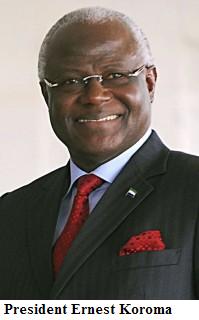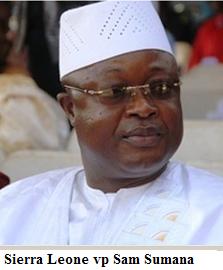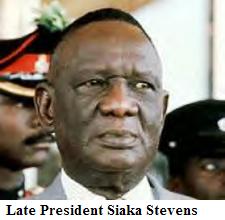Mar
8, 2015
APC
Sacks Vice PresidentThe Vice President of the Republic of
Sierra Leone,
Alhaji Samuel Sumana, has been expelled from the ruling All Peoples
Congress, APC, party. News of the dismissal came in a press release
signed by the party secretary general. The decision was taken at
a
meeting, chaired by the President of the republic, of
the National Advisory Committee of the party, the second highest body
within the party structure. The Committee met following the conclusion
of work of an Investigation Committee, set up to examine various
allegations against the vice president. The Investigation Committee was
chaired by I.B. Kargbo, former government minister and currently
adviser to the President. The APC
party's press release cited various
misdeeds by
the vice president, including "anti-party activities, fermenting (sic) violence and deceit."
 There have been rumors for some
years of discord between the President,
Dr Ernest Bai Koroma, and his vice. During campaigning leading up to
the last election in 2012, there was a long delay before President
Koroma announced that Alhaji Sumana would continue to be his running
mate (after their initial election in 2007), during which period
speculation was rife that the President would choose another number
two. The decision had presented the President with a clear opportunity
to relieve himself of his second in command, with recent precedent on
his side: In 2002, running for reelection, late President Ahmed Tejan
Kabbah had chosen Solomon Berewa as his vice presidential running mate
in favour of then Vice President Joe Demby. The decision had caused
raised eyebrows at the time, but at least it was done in a politically
honourable fashion, at a time when the party was seeking a fresh
mandate from the people. As things stand now, with
elections over and the vice president in place, the Constitution does
not give the President the mandate to dismiss his vice, and apparently
other means must be sought. The
conventional wisdom is that what stayed the President's hand in 2012
was
that the vice president hails from Kono, an important swing state from
which both the APC and the main opposition SLPP have drawn considerable
support.
There have been rumors for some
years of discord between the President,
Dr Ernest Bai Koroma, and his vice. During campaigning leading up to
the last election in 2012, there was a long delay before President
Koroma announced that Alhaji Sumana would continue to be his running
mate (after their initial election in 2007), during which period
speculation was rife that the President would choose another number
two. The decision had presented the President with a clear opportunity
to relieve himself of his second in command, with recent precedent on
his side: In 2002, running for reelection, late President Ahmed Tejan
Kabbah had chosen Solomon Berewa as his vice presidential running mate
in favour of then Vice President Joe Demby. The decision had caused
raised eyebrows at the time, but at least it was done in a politically
honourable fashion, at a time when the party was seeking a fresh
mandate from the people. As things stand now, with
elections over and the vice president in place, the Constitution does
not give the President the mandate to dismiss his vice, and apparently
other means must be sought. The
conventional wisdom is that what stayed the President's hand in 2012
was
that the vice president hails from Kono, an important swing state from
which both the APC and the main opposition SLPP have drawn considerable
support.
|Despite his expulsion from the APC, Alhaji Samuel Sumana remains as Vice President of the republic of Sierra Leone, but pundits assert that his grip on this position is
tenuous. The APC, past masters at political and Constitutional
manipulation, may use some section of the Constitution to impeach him.
In an interview, the chairman of the Investigation Committee, I.B.
Kargbo, mentioned in passing that the Sierra Leone Constitution
requires the vice
president to be a member of a recognized political party. Alhaji
Sumana, apparently alert to this scenario,
reportedly was already in the process of putting together his own
party, but it is unclear whether
this will save him as all new parties
must be endorsed by the Political Parties Registration Commission. To
add to his woes, the vice president is currently under quarantine,
after one of his bodyguards died from Ebola. This isolation would make
it even more difficult for him to mount an effective defense if the
plan to remove him is mounted swiftly.
position is
tenuous. The APC, past masters at political and Constitutional
manipulation, may use some section of the Constitution to impeach him.
In an interview, the chairman of the Investigation Committee, I.B.
Kargbo, mentioned in passing that the Sierra Leone Constitution
requires the vice
president to be a member of a recognized political party. Alhaji
Sumana, apparently alert to this scenario,
reportedly was already in the process of putting together his own
party, but it is unclear whether
this will save him as all new parties
must be endorsed by the Political Parties Registration Commission. To
add to his woes, the vice president is currently under quarantine,
after one of his bodyguards died from Ebola. This isolation would make
it even more difficult for him to mount an effective defense if the
plan to remove him is mounted swiftly.
During his seven-plus years as Vice President of the Republic, Alhaji Samuel Sumana has never been far from controversy. In 2011 there was a much publicized shootout in Kono in which he was implicated, necessitating a lengthy investigation by the Inspector-General of Police. In a power struggle within his district he was reportedly at loggerheads with current Minister of Internal Affairs, Diana Konomanyi. The Aljazeera Timbergate scandal involved foreign businessmen allegedly paying bribes to secure the influence of the vice president's office. And a US businessman, Mark Heligmann made sweeping allegations of corruption against him, including the channelling of loans to fund the APC in its ultimately successful bid for power in 2007. Throughout all these controversies, Vice President Sam Sumana has survived, pundits say, because he has had the backing of the President. And he is in dire danger of being removed from office now because he no longer enjoys the support of the President, not because of any violation of laws or the Constitution he may have committed.
This would by no means be the first time for an APC leading light to suddenly disappear into political oblivion. Last year, the speaker of the House of Parliament, number three in the Constitutional hierarchy, was swiftly removed from office by his colleagues in Parliament (read Sierra Leone Speaker Resigns). And APC's founder, late President Siaka Stevens, a grand master at political skulduggery, was able upon retirement to thwart the ambitions of his longtime stalwart second-in-command, S.I. Koroma.
The recent political machinations may not be unconnected with the campaign, muted during t he Ebola outbreak but now
apparently revived as
the 2017 elections draw near, to somehow extend for President Koroma
the two term limit imposed by the Constitution. A Constitutional Review
Commission was suddenly revived two years ago (read Review
of Sierra Leone Constitution Planned)
amid suspicions that this body would propose some kind of an extension and this
would be endorsed by the APC-controlled parliament. Dubious
disqualifications of SLPP candidates at the last election along with
incentives and coercions applied among the existing, disunited SLPP
parliamentarians have made it likely that the APC could command a two
thirds majority in Parliament, which would be necessary for
Constitutional amendment. The situation is eerily reminiscent of the
aforementioned President Siaka Stevens and the introduction of the
One-Party State.
he Ebola outbreak but now
apparently revived as
the 2017 elections draw near, to somehow extend for President Koroma
the two term limit imposed by the Constitution. A Constitutional Review
Commission was suddenly revived two years ago (read Review
of Sierra Leone Constitution Planned)
amid suspicions that this body would propose some kind of an extension and this
would be endorsed by the APC-controlled parliament. Dubious
disqualifications of SLPP candidates at the last election along with
incentives and coercions applied among the existing, disunited SLPP
parliamentarians have made it likely that the APC could command a two
thirds majority in Parliament, which would be necessary for
Constitutional amendment. The situation is eerily reminiscent of the
aforementioned President Siaka Stevens and the introduction of the
One-Party State.
 There have been rumors for some
years of discord between the President,
Dr Ernest Bai Koroma, and his vice. During campaigning leading up to
the last election in 2012, there was a long delay before President
Koroma announced that Alhaji Sumana would continue to be his running
mate (after their initial election in 2007), during which period
speculation was rife that the President would choose another number
two. The decision had presented the President with a clear opportunity
to relieve himself of his second in command, with recent precedent on
his side: In 2002, running for reelection, late President Ahmed Tejan
Kabbah had chosen Solomon Berewa as his vice presidential running mate
in favour of then Vice President Joe Demby. The decision had caused
raised eyebrows at the time, but at least it was done in a politically
honourable fashion, at a time when the party was seeking a fresh
mandate from the people. As things stand now, with
elections over and the vice president in place, the Constitution does
not give the President the mandate to dismiss his vice, and apparently
other means must be sought. The
conventional wisdom is that what stayed the President's hand in 2012
was
that the vice president hails from Kono, an important swing state from
which both the APC and the main opposition SLPP have drawn considerable
support.
There have been rumors for some
years of discord between the President,
Dr Ernest Bai Koroma, and his vice. During campaigning leading up to
the last election in 2012, there was a long delay before President
Koroma announced that Alhaji Sumana would continue to be his running
mate (after their initial election in 2007), during which period
speculation was rife that the President would choose another number
two. The decision had presented the President with a clear opportunity
to relieve himself of his second in command, with recent precedent on
his side: In 2002, running for reelection, late President Ahmed Tejan
Kabbah had chosen Solomon Berewa as his vice presidential running mate
in favour of then Vice President Joe Demby. The decision had caused
raised eyebrows at the time, but at least it was done in a politically
honourable fashion, at a time when the party was seeking a fresh
mandate from the people. As things stand now, with
elections over and the vice president in place, the Constitution does
not give the President the mandate to dismiss his vice, and apparently
other means must be sought. The
conventional wisdom is that what stayed the President's hand in 2012
was
that the vice president hails from Kono, an important swing state from
which both the APC and the main opposition SLPP have drawn considerable
support. |Despite his expulsion from the APC, Alhaji Samuel Sumana remains as Vice President of the republic of Sierra Leone, but pundits assert that his grip on this
During his seven-plus years as Vice President of the Republic, Alhaji Samuel Sumana has never been far from controversy. In 2011 there was a much publicized shootout in Kono in which he was implicated, necessitating a lengthy investigation by the Inspector-General of Police. In a power struggle within his district he was reportedly at loggerheads with current Minister of Internal Affairs, Diana Konomanyi. The Aljazeera Timbergate scandal involved foreign businessmen allegedly paying bribes to secure the influence of the vice president's office. And a US businessman, Mark Heligmann made sweeping allegations of corruption against him, including the channelling of loans to fund the APC in its ultimately successful bid for power in 2007. Throughout all these controversies, Vice President Sam Sumana has survived, pundits say, because he has had the backing of the President. And he is in dire danger of being removed from office now because he no longer enjoys the support of the President, not because of any violation of laws or the Constitution he may have committed.
This would by no means be the first time for an APC leading light to suddenly disappear into political oblivion. Last year, the speaker of the House of Parliament, number three in the Constitutional hierarchy, was swiftly removed from office by his colleagues in Parliament (read Sierra Leone Speaker Resigns). And APC's founder, late President Siaka Stevens, a grand master at political skulduggery, was able upon retirement to thwart the ambitions of his longtime stalwart second-in-command, S.I. Koroma.
The recent political machinations may not be unconnected with the campaign, muted during t